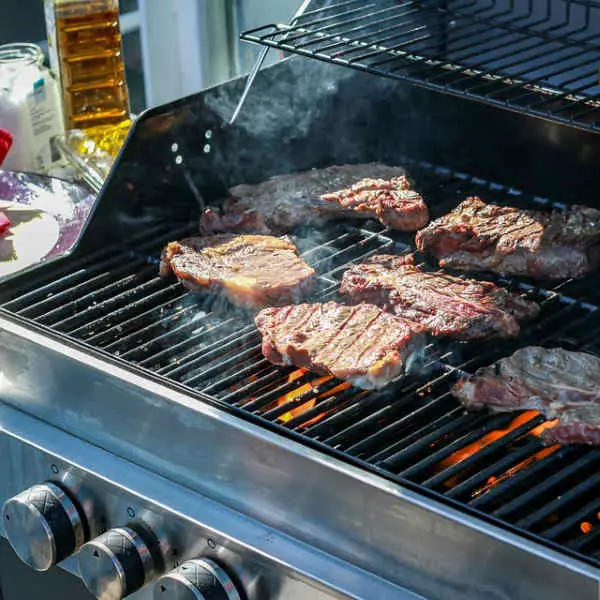
There are 2 types of gas grills: natural gas (NG) and (liquid) propane (LP).
They are similar, but not the same.
When choosing a gas grill, it’s common to wonder exactly what is the difference between them, and I’ll highlight all of them for you in detail.
In this grill comparison guide, I’ll show you the differences in:
- Taste
- Cost
- Heat
- Environmental Concerns
- How Are They Obtained
- Portability
- Safety
- Storage Space
- Convenience
- Availability
As a bonus, I’ll show you the pros and cons of both types of grills and explain if the two are compatible and how or if conversion is possible.
Differences Between Natural Gas and Propane Grills
Both propane and natural gas are gaseous products, though propane can be compressed into a liquid form, i.e. liquid propane, sometimes abbreviated as LP.
Natural gas has another name: fossil or mains gas.
Natural Gas Vs Propane Grill Comparison Table
| Natural Gas | Propane | Winner | |
|---|---|---|---|
| State | Gas | Liquid | N/A |
| Taste | No difference | No difference | Tie |
| Setup Cost | More | Less | Propane |
| Fuel Cost (at the time of writing) | $1.75 per MMbtu | $2 per gallon | Natural Gas |
| Grill Cost | More | Less | Propane |
| Grills Heat Output | No difference | No difference | Tie |
| BTUs per Cubic Foot | 1,030 | 2,516 | Propane |
| Environmental Impact | No difference | No difference | Tie |
| Obtainability | Gas line | Tanks | Natural Gas |
| Portability | Propane | ||
| Safety | More | Less | Natural Gas |
| Storage Space | More | Less | Natural Gas |
| Convenience | More | Less | Natural Gas |
| Availability | Not always | Always | Propane |
See this video if you don’t like reading long, boring text or if you just like videos:
Difference #1: Taste
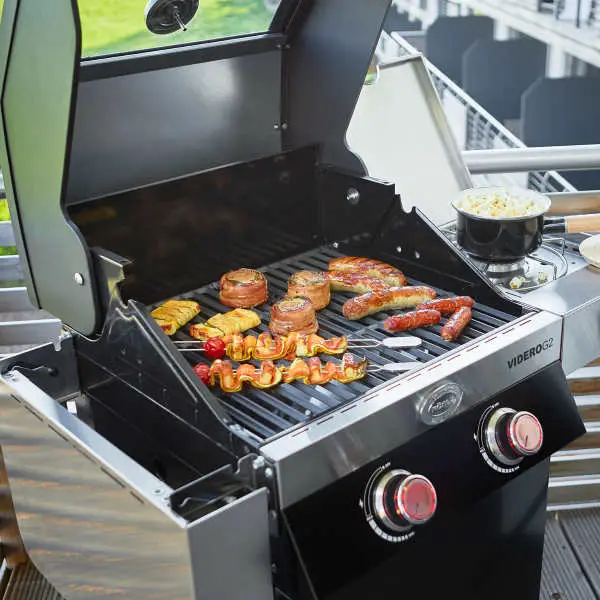
Some grillers say that food cooked on a propane grill tastes better.
Personally, I don’t notice the difference.
I’ve cooked on both propane and natural gas and I didn’t notice any difference in taste whatsoever.
One reason for this could be the that propane burns at a higher temperature than natural gas (more on this below).
Difference #2: The Cost

Price Difference Between These Two Types of Grills
Natural gas grills tend to be more expensive than their propane counterparts.
This is because they’re more complex than propane grills. They have more components and are built in a slightly different way.
Price of a Natural Gas Outlet Project
Most urban households get natural gas already, but don’t have a natural gas outlet available for grilling. Obtaining one is usually a separate side project that you would do by yourself if you know the construction trade, or else hire someone to come and do it for you.
When considering the cost of gas, this project often gets ignored while crunching the numbers, but it can make a big difference in the final cost breakdown, especially if there are hidden problems with the project that makes the actual cost even higher.
Price of Natural Gas
Is Natural Gas Expensive to Use?
The price of natural gas is very cheap compared to propane and most natural gas grillers don’t even consider the price of running their grill into their monthly budget considerations as it is negligible.
But you will definitely consider the price of purchasing a new grill.
Price of Propane Tank Exchange
Propane is purchased by the tank unit, and that is how the price is typically factored in. Each tank comes with the added cost of the tank itself, though.
The convenience of propane tank exchange stations is usually easy to do. But the overall cost of this method can be more pricey than other methods if you grill often.
If you grill occasionally, this can work out well.
Unfortunately, the 1 lb camping propane tanks cannot be exchanged.
How Much Does It Cost to Exchange a Propane Tank?
In general, the price for exchanging a 20lb propane tank is about $19.
But there have been some interesting movements with individual companies who are starting up to allow propane tank exchanges of different sizes – including 1 lb camper tanks.
They are not nationwide and will typically only have office locations in larger cities.
Their business model includes the exclusive purchase and re-use of their propane tank, but all of this can still be very financially inexpensive if you live in the right location.
You can, however, refill some canisters (Coleman, for example) by yourself with the help of an adapter. See the video below how.
Refilling Propane Tanks
Some more budget-minded grillers may opt to refuel their tank at home improvement stores.
These stores would sell the larger propane tanks, camping propane tanks, grills, and a few other consumer-geared items, and lots of tools, lumber, and construction supplies.
To refill your tank, you would visit the customer service desk and wait for an employee to refill your tank for you – even some 1 lb camping propane tanks.
How Much Does a Propane Tank Refill Cost?
Refilling stations usually charge $3 to $4 per gallon.
A 20 lb tank holds 4.7 gallons of propane. This means filling a whole tank will cost you $14.1 to $18.8. It’s a bit cheaper than exchanging, and the difference becomes larger with every refill.
Keep this in mind if you often fire up the grill.
Summary: Is Propane Cheaper Than Natural Gas?
In most cases, including long-term, no.
Even though natural gas grills and installing a natural gas line at your home is much more expensive than a propane grill with a tank of propane, natural gas is almost 4.5 times cheaper than propane (according to this Santa Energy article).
These are not the only factors that make propane more expensive than natural gas. One other important factor is also obtainability (more on that below). In short, natural gas is always available when you have the line hooked up to the grill while propane isn’t and you have to either refill or exchange the tank for a new one.
Think also how much time and gas you spend going to your local hardware store or gas station to do this. If you’re grilling in the backyard and don’t have a portable unit, it’s not worth it.
Natural Gas vs Propane Cost Calculator
To see how much you’ll save when grilling on natural gas, use this calculator.
See current prices of natural gas and propane in the US.
Difference #3: Heat
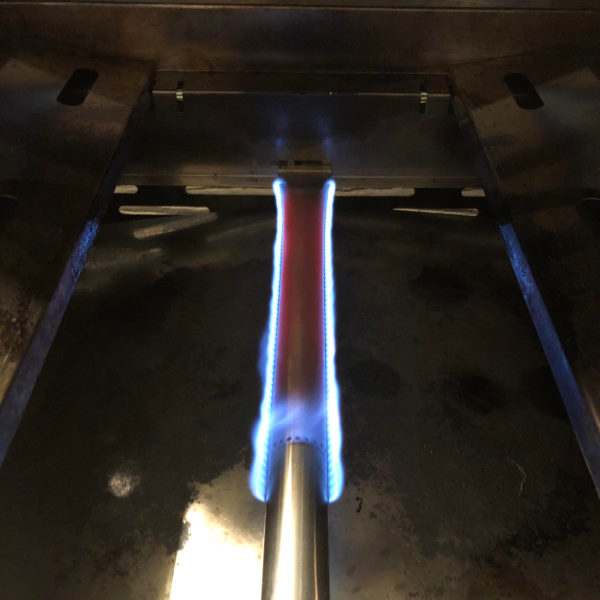
They both burn at very similar temperatures, but with a 40°F / 23°C degree difference, amounting to a 1.1 % difference in heat.
While it’s true that propane burns about 3 times hotter than natural gas, natural gas grills are designed in such a way (they have larger orifices that increase gas flow) that provide the almost same amount of heat as propane ones.
Difference #4: Environmental Concerns

The Environmental Cost of Extracting Natural Gas vs Propane Gas
Which Is Better for the Environment: Propane or Natural Gas?
It’s too difficult to say how much of an environmental impact extracting natural gas is on the environment. Because of the difficulty of measuring this, some say more while others say less. As of today, there isn’t a standard or way to measure this.
But propane gas is a byproduct of processing crude oil, so it will be produced as long as oil and gasoline products are in use. Experts have tried to separate out the cost of it, but propane is too closely intertwined with the crude oil processing methods to be able to measure out separately.
The Environmental Cost of Delivering
Natural gas is delivered through the utility pipes beneath the urban center (such as a city), so the environmental cost of using this type of grill when it comes to delivery has no environmental impact or cost at all.
Some common appliances that also use natural gas are ovens and hot water heaters.
Propane, on the other hand, poses a bit of a problem. Because propane is used and ported around in propane tanks, those tanks tend to end up in the landfill.
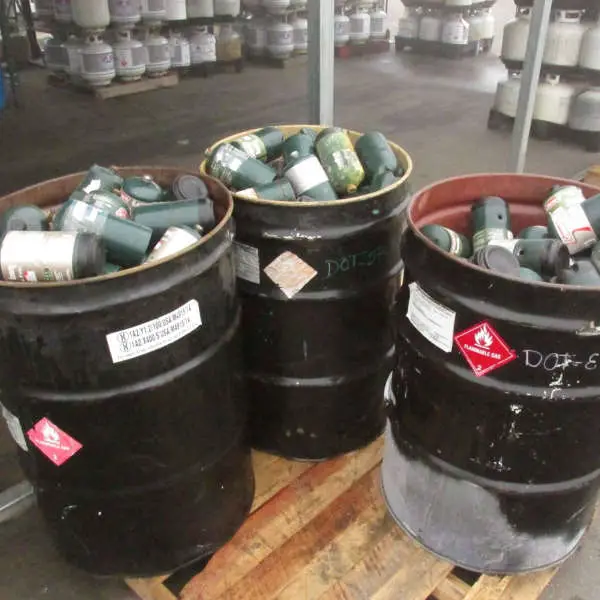
This can happen because the tank has some sort of defect or problem and it was cheaper or more convenient to simply toss out the old, empty tank rather than exchange or refill it.
Also, most 1 lb tanks cannot be refilled (at least officially).
The tanks themselves are made of steel and aluminum, so they’re never going to break down in the landfill.
Released Gas Into the Environment
Whenever you turn on your gas grill, it’s likely that a tiny portion of the gas will escape into the environment, and for this minuscule amount, propane is less harmful than natural gas.
On the overall landscape of pollution, this amount is insignificant and conscientious grillers shouldn’t worry about polluting the environment, no matter which energy source they choose.
Difference #5: How Are They Obtained
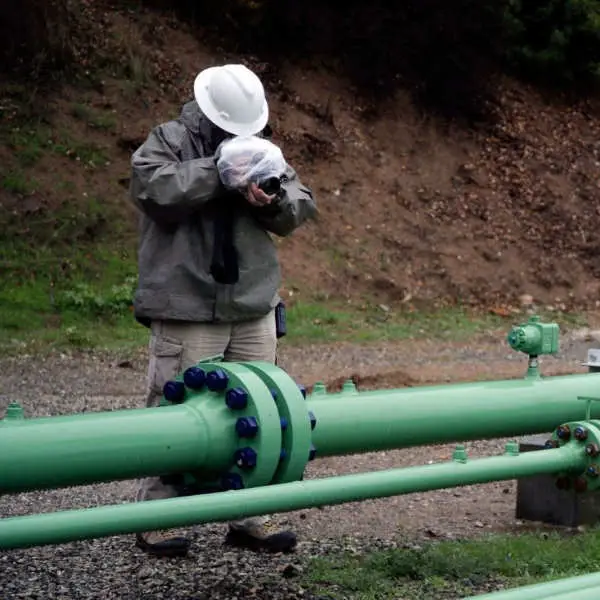
Natural gas is supplied to a city or town through the utility pipes and nearly everyone will use it for things like their oven or hot water heater and are billed monthly for their usage.
Generally, it is quite cheap.
Propane, on the other hand, has to be purchased separately. For a standard-sized propane tank, typically you would purchase one at a gas station or department store, deplete it, and then come back to exchange the old, empty tank for a new, refilled one.
Customers usually don’t refill their own propane tanks. For smaller sizes of propane tanks, such as camping tanks, typically you would purchase them at a department store that sells outdoor goods, and when the tank gets low, you would toss the tank in the trash and buy a new one.
Difference #6: Portability
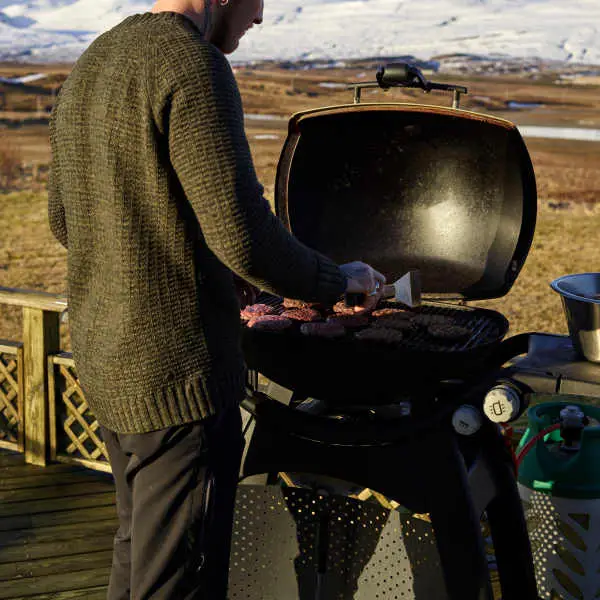
One of the most important and primary differences between natural gas grills and propane grills is their portability.
With a natural gas grill, where you put the grill is going to be limited to where your natural gas outlet is located. So you might be able to move your grill a few feet in any direction, but you’re not going to be able to take it with you to go camping – there’s no such thing as a portable natural gas container.
With a propane-based grill, you can take the tank with you anywhere you want to go grilling.
Difference #7: Safety
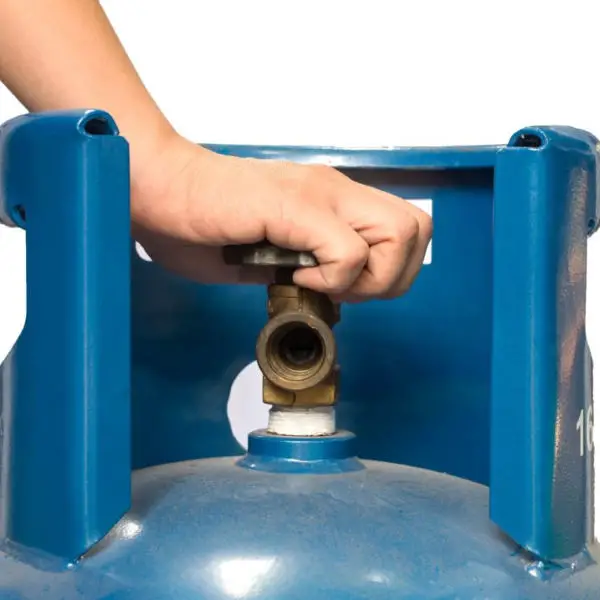
Another reason that differentiates these 2 gases and grill types is how safe they are.
Is Natural Gas Safer Than Propane?
Yes.
Why Is Natural Gas Safer Than Propane?
Natural gas is lighter than propane. It’s even lighter than air itself.
If there’s a leak, natural gas will simply dissipate and float away.
Propane, on the other hand, stays around the leakage which is at or near the grill, making it a potential safety hazard. This is the reason why you shouldn’t cook or store the grill in closed, unventilated spaces.
It should be noted that ignitions and explosions are quite rare (explosions are rarer) but there’s still a chance it might happen, even with natural gas.
That said, if you regularly check for leaks and follow other safety guidelines, you’ll be safe with both options.
Difference #8: Storage Space
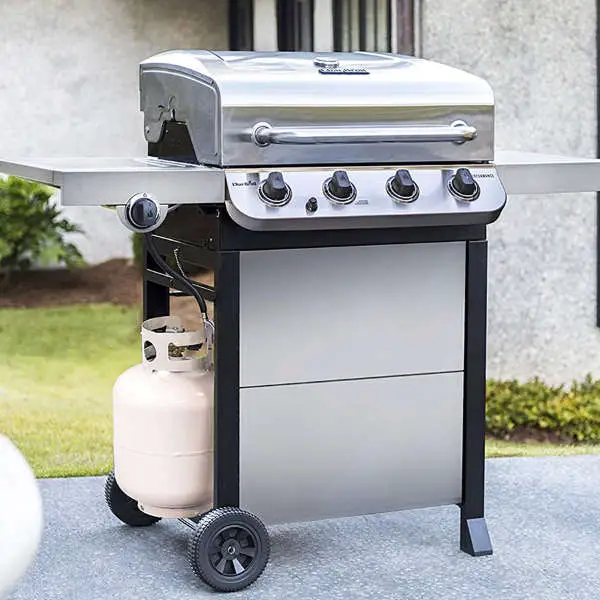
For a propane grill, you need to place the tank somewhere near the grill. While many grills have a special place designed for the tank (like the cabinet under the grill), the tank itself takes up space which you’ll have less for other things such as plates, utensils, condiments, spices, etc.
You don’t have to worry about this with natural gas grills because the gas comes from an outlet that itself consists of a small hose.
Difference #9: Convenience
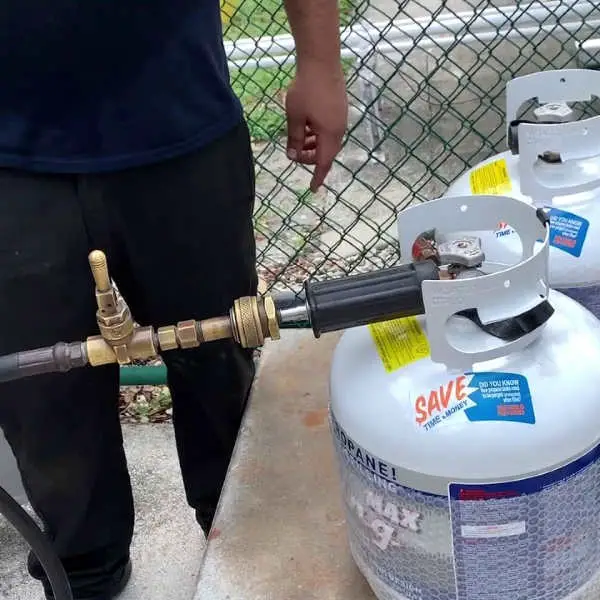
You don’t have to worry about running out of fuel when cooking on a natural gas grill.
Propane grills are a different story. You have to exchange or refill the tank once empty and you have to constantly monitor how much propane you still have in the tank if you don’t want to run out of fuel in the middle of a BBQ.
You can have a spare tank nearby but this only means you’ll have to exchange/refill it later than sooner.
Difference #10: Availability
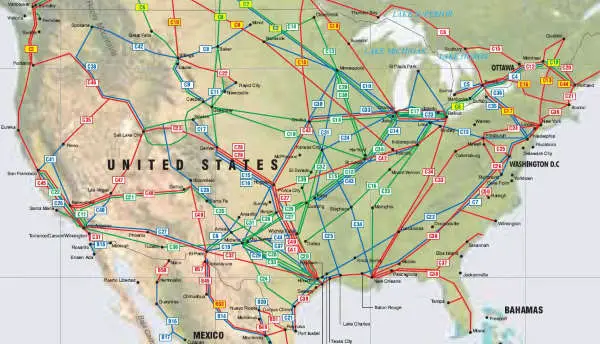
To grill on natural gas, you need a natural gas outlet which isn’t always available.
No matter where you are, even if you’re in the middle of nowhere, there’s always a gas station or a store that has propane tanks or at the very least refills them.
Also, you’ll easier find a propane grill than a natural gas one.
Pros and Cons of Natural Gas vs Propane Grills
Natural Gas Grills
- Abundant fuel supply
- Cheaper fuel
- No need to worry about running out of fuel mid cookout
- High installation and grill costs
- Not mobile
Propane Grills
- Mobility
- Cheaper grills
- No fuel installation required
- Propane tanks can be purchased or refilled almost anywhere
- Plenty of grill models to choose from
- Fuel costs more
- Tanks must be exchanged or refilled regularly
Propane and Natural Gas Grill Compatibility
Natural Gas to Propane Grill Conversion
Can a Natural Gas Grill Be Converted to Propane?
In most cases, not officially. Some manufacturers are not fans of grillers converting their grills and any kind of attempt will void the warranty of the grill. There are 2 reasons for this:
- Safety
- Price
Safety
The conversion is not as simple as vice versa. Removing the gas line from the grill and connecting the propane tank simply won’t do.
Why? The two fuels are not interchangeable. But some creative grillers have actually managed to do this:
Playing with gas is dangerous. One wrong spark and BOOM.
This is one of the reasons why gas grill manufacturers don’t allow conversions.
Price
Sure, you can get a conversion kit for and do the conversion yourself with some basic tools and a little thinking, but it’s much better for the manufacturer to sell you a brand new grill.
Do you have a Weber natural gas grill that you paid $500 for but want to connect a propane tank to it? Great! Buy the same exact model except it runs on propane for the same price of $500 or even more. Do you understand what I’m trying to say?
Converting a Propane Grill to Natural Gas
Can You Convert a Propane Grill to Natural Gas?
In most cases, yes, you can convert them using a conversion kit (they usually cost about $40) yourself.
Why you can’t just connect your natural gas line to your propane grill and how to convert it, check out this article.
Which Is Better Natural Gas or Propane Grill?
Unfortunately, there is no “one size fits all” answer here.
You’ll have to consider all of the factors above to make the right decision.
Once you made your choice, consider one of these models below.
The Best Propane Grill
- 5 main (10,000 BTU each), plus sear burner (12,000 BTU), and lidded side burner (9,000 BTU); Total 71,000 BTU
- Porcelain-enameled cooking grates and warming rack offer a total of 797 square
- Heavy duty full stainless steel double-layer lid for heat retaining
- Electronic ignition system
- Removable grease tray
- Built-in thermometer
- 4 lockable casters
This particular model is considered the best gas grill for under 400 dollars. See this guide to read the in-depth review.
The Best Natural Gas Grill
- 529 Square inches of cooking space over 3 burners
- 10-foot flexible hose included
- Gs4 grilling system: improved infinity ignition, burners, porcelain-enameled Flavorizer Bars, and grease Management system
- Porcelain-enameled, cast iron cooking grates
- 6 tool hooks and 2 large wheels
- Built-in lid thermometer
- 10-year guarantee
This particular model is considered the best gas grill under $500. See this guide to read the in-depth review.
If you still aren’t sure, then get yourself a propane grill that can be easily converted into natural gas and a conversion kit.
Natural Gas and Propane Grills Are Not the Same
What is the difference between natural gas and propane grills? The differences between these 2 fuels come down to whether or not you have a natural gas outlet already, and if so, whether you plan to take your grill to different places, such as camping, or whether you plan to keep grilling out in your backyard.
Do you know how much natural gas you can get from crude oil?



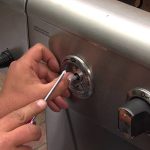
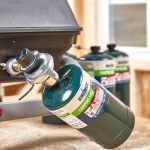

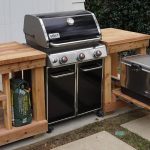
Be the first to comment